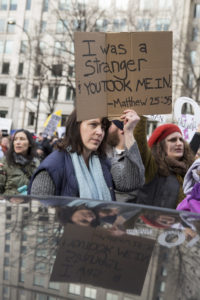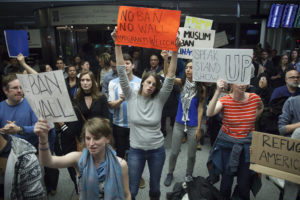February 9, 2017
Maryland senator, agencies continue to fight refugee ban
NATIONAL
By Erik Zygmont, Catholic News Service

A woman holds a sign as protesters march toward the U.S. Capitol in Washington Jan. 29. The group was protesting President Donald Trump’s executive memorandum suspending admission of any refugees to the U.S. for 120 days and banning entry for 90 days of people from seven predominantly Muslim nations. (CNS photo/Jaclyn Lippelmann, Catholic Standard)
BALTIMORE (CNS) — As President Donald Trump’s temporary suspension of the country’s refugee resettlement program was winding through the federal court system, a U.S. senator from Maryland joined Catholic Relief Services in calling for continued engagement against the ban.
“Our desire is for the president to withdraw this executive order, for Congress to enact legislation that makes it clear that we won’t accept this, or if the courts knock down the legitimacy and legality of this — we want it gone,” said Sen. Benjamin L. Cardin, D-Maryland, during a Feb. 6 news conference at Catholic Relief Services headquarters in Baltimore.
Trump’s order, signed Jan. 27, suspended the entire U.S. refugee resettlement program for 120 days and banned entry of all citizens from seven majority-Muslim countries — Syria, Iraq, Iran, Sudan, Libya, Yemen and Somalia — for 90 days.
Trump has maintained that his action is in the best interests of national security.
Cardin praised CRS, Lutheran Immigration and Refugee Service, and other organizations that make Baltimore what he called “one of the major centers” for refugee advocacy and resettlement.
“We have here in Baltimore groups that understand America’s strength is in our diversity,” the senator said. The organizations “understand America’s values are very much interwoven with our commitment to help refugees around the world, and America’s leadership is indispensable in moving those programs forward,” he added.
Bill O’Keefe, CRS vice president of governmental relations and advocacy, told reporters the refugees are not terrorists but are fleeing terrorists. He said he had heard earlier this year from a tent-dwelling family in Iraqi Kurdistan who had fled the Islamic State, fearing that the extremists would take their coming-of-age daughter as a sex slave or child bride.
“I’m a father; I have a daughter,” O’Keefe said. “The unspeakable horror of that possibility was something that touched me personally, and I know will touch all Americans who care about their children and who care about humanity.
“Those are the people we see around the world who are refugees and immigrants,” he added, “people who are fleeing violence, women, children and men who are fleeing violence.”
Cardin asked the media to help “put a face” on the refugee issue.
“The American people really don’t understand the refugee program,” he said. “They have to understand who these people are.”
He explained that potential refugees identified for resettlement are vetted by the United Nations before they undergo the U.S. vetting process, which can last 18- to 24-months.
“We are safe,” Cardin said. “Extreme vetting is already done.”

People gather for a protest at the Arrivals Hall of San Francisco’s International Airport after people coming in from Muslim-majority countries were held Jan. 28 by border control as a result of the new executive memorandum by U.S. President Donald Trump. (CNS photo/Peter Dasilva, EPA)
The senator also argued that banning refugees is counterproductive from a national security standpoint because such a ban could be used by extremists as a “recruitment tool” or motivation for “self-radicalization.”
“We have also heard from our friends in the Middle East that (the ban) makes it more challenging for leaders to work with the United States,” Cardin said.
CRS, the U.S. bishops’ overseas relief and development agency, provided background information as well as comments from several Syrian refugees, including Khaled Basheer, his wife and three children, who fled Aleppo when a bomb destroyed their home. They were forced live in fear in a tent on the city’s outskirts amid gunfire and explosions.
“We were also very frightened of an attack by the (Islamic State),” Basheer said, according to CRS. “We heard such horrible stories how cruelly they kill innocent people and rape women and young girls.”
The family hopes to make it to Germany.
“Daddy promised we will get a nice home there,” said Omama, Basheer’s 8-year-old daughter, according to CRS. “And he said there will be good people there.”
Nina Zelic, director for refugee services for Lutheran Immigration and Refugee Service, said that nine refugee organizations, of which the Lutheran agency is one, have resettled about 37,000 refugees and special immigrant visa holders in the fiscal year that started Oct. 1.
“We’re extremely grateful that arrivals are resuming,” Zelic said, citing a federal judge’s Feb. 3 stay of Trump’s order. “Every day refugees are allowed into this country means that about 150 more people’s lives are saved, and that individuals are able to reunite with family and friends they thought might be lost forever.”
Cardin said that despite the stay, people “need to remain totally engaged” on the issue, which he predicts will be an ongoing battle regardless of how Trump’s action fares.
O’Keefe said the issue has “systemic” implications.
“In Lebanon, for example, and Jordan, they’re taking hundreds of thousands of refugees, with an understanding that we take just a little bit of the most vulnerable,” he said. “If we don’t play our part, it will be very difficult for them to make the tough decisions … in their societies, to play their part. And we need them to do that from a national security perspective.”
Zygmont is on the staff of the Catholic Review, the website and magazine of the Archdiocese of Baltimore.


 Facebook
Facebook Youtube
Youtube
